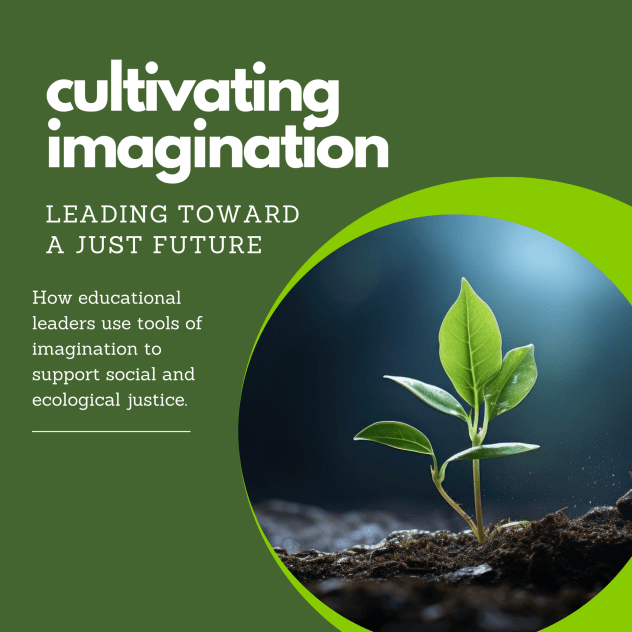By Michael Dé Danann Datura, principal of Cortes Island School
 This blog is an extension of Episode 5 of the Cultivating Imagination podcast.
This blog is an extension of Episode 5 of the Cultivating Imagination podcast.
As an “academic” it can be frustrating to have every lecture or big idea followed up by questions of: “…but what do we do now? …what are the practical implications? …how and why will this matter to my students on Monday morning?” As if having courageous conversations about important ideas or philosophies or, for example, the role that worldview plays on complex matters such as the climate catastrophe are “doing nothing.” On the other hand, as activists and, indeed, as educators, such vexing inquiries are absolutely vital; and it is this pragmatic insistence in the field of education that is, perhaps, one of its most admirable hallmarks. Lest our heads fill with the stale air of Grand Theory—mixed, as it tends to be, with the effluence of Ego—and float away from the world towards some highfalutin tower in the clouds. I seem to recall some scruffily-bearded German who had something to say on the topic a century or two ago, but, alas. No one has time for big old books these days.
Where does this age-old schism leave us, then, with questions of the “imagination”—a nebulous concept if ever there was one—and its role in Education and The Future? My advice for teachers interested in notions of imagination (and ecojustice) is similar to that of American historian Howard Zinn when asked for advice for history teachers: “find friends.” (Note: I am, however, also aware of the dangers in the present age of neo-fascists and algorithms, and neo-fascist algorithms, of “finding bubbles,” so perhaps we can qualify this advice to something like: “find an educated discourse community.”) For my part, I was fortunate to find such a community at Simon Fraser University with the Center for Imagination in Research, Culture and Education (formerly the Imagination Education Research Group). There is, however, absolutely no reason why this educated community need be based in an educational institution; it could be a reading group, a knitting group, a potluck-loving posse of anarcha-epicureans, a school district-based action research team, or perhaps (gulp) even a “blog-community” (depending, of course, on the level of facilitation and rules of engagement; for an educated blog community centered around imagination consider Gillian Judson’s imaginED).
In order to develop the “cognitive tools” (Egan, 1997; Egan & Judson, 2016) required to delve into complex topics such as the climate catastrophe, or the role of “imagination” in developmental psychology, or the role of “imagination” in political consciousness (hint: they are not necessarily the same “imagination”), one requires an educated crew who are employing things like: cultural-historical critique of our received ideas (or “metanarratives”); recognizing the limits of knowledge systems (Egan calls this “radical epistemic doubt”); engaging with otherness in good faith, and—perhaps this is where the work of Rob Hopkins (2019) comes in most strongly—a generative, playful, outside-the-box ability to ask “what if?” and “why not?” beyond “what-is.” We all recognize the advantages and the necessity—in the sense of fluency and nuance—of “immersion” experiences when learning a new language and I suspect learning a new cognitive toolkit is an analogous experience. Perhaps this is why the Latin roots of “education” mean something like “to lead out,” “to bring forth,” or, likely more accurately, “to drag out” (see Serres, 1997). Wading into the realm of “critical imagination” will be something analogous to a foreign exchange; one that we choose perhaps (or not), but with the lived experience of being dragged or thrown (see Heidegger’s Geworfenheit, “throwness”) into a initially strange milieu. This is, presumably, why so many choose familiar shores instead of this “cosmopolitan” (Stengers, 2010) unknown.
So: find friends, question things, read, listen to the other, go forth, suffer, and, on a personal note, remember, as an a scruffily-bearded Russian once observed: “the urge to destroy is also an [imaginative] urge.” Why not?
Hear more from our leaders in the Cultivating Imagination podcast series.
References:
Egan, K. (1997). The educated mind: How cognitive tools shape our understanding. University of Chicago Press.
Egan, K. & Judson, G. (2016). Imagination and the engaged learner: Cognitive tools for the classroom. Teachers College Press.
Hopkins, R. (2019). From what is to what if. Chelsea Green Publishing.
Serres, M. (1997). The Troubadour of Knowledge. University of Michigan Press.
Stengers, I. (2010). Cosmopolitics I. University of Minnesota Press.


